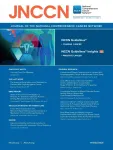(Press-News.org) PLYMOUTH MEETING, PA [February 16, 2021] -- New research in the February 2021 issue of JNCCN--Journal of the National Comprehensive Cancer Network examined body mass index (BMI) data for people with HER2-positive early breast cancer, and found a 5% weight loss in patients over two years in was associated with worse outcomes. Weight gain over the same time period did not affect survival rates.
"The finding that weight loss, and not weight gain, was associated with worse outcomes is unexpected," said lead researcher Samuel Martel, MD, Universitè de Sherbrooke, Quebec, Canada, who worked with researchers in Belgium, Brazil, Germany, Italy, Switzerland, and the United Kingdom, as well as the National Cancer Institute and the Mayo Clinic in the United States. "We were unable to make a distinction between intentional versus unintentional weight loss, so it's a matter of speculation whether worse outcomes were due to weight loss, or vice versa. We hope our findings highlight the importance of incorporating consecutive and prolonged data collection on weight in oncology trials, and gaining greater understanding of the metabolic processes after cancer diagnosis that may impact outcomes."
The BMI data came from the ALTTO BIG 2-06 trial, which collected height and weight data in 8,381 patients with HER2-positive early breast cancer treated with chemotherapy plus trastuzumab and/or lapatinib. 2.2% were underweight at the start of treatment, 45.3% were normal weight, 32.1% were classified as overweight, with another 20.4% obese--defined as a BMI greater than 30. Initial obesity was associated with worse outcomes, including more frequent and serious adverse events leading to treatment discontinuation, as well as significantly worse overall survival rates.
"It was surprising to see that more than 5% weight loss at 2 years was associated with poorer distant disease-free survival. Is our general advice to obese/overweight patient to exercise and lose weight wrong?" questioned Anthony D. Elias, MD, University of Colorado Cancer Center, a member of the NCCN Clinical Practice Guidelines (NCCN Guidelines®) Panel for Breast Cancer. "Careful examination of the Kaplan-Meier hazard plots suggests that the relapse curves for those with weight loss are steeper in the second and third years of follow-up, but thereafter are relatively parallel. It's possible that the weight loss observed early may be an indication for impending relapse of breast cancer."
The study highlights the importance of weight management in cancer survivorship. The authors hope their findings may provide the basis for further research and oncology trials to guide weight control during the survivorship period.
INFORMATION:
To read the entire study, visit JNCCN.org. Complimentary access to "Body Mass Index and Weight Change in Patients With HER2-Positive Early Breast Cancer: Exploratory Analysis of the ALTTO BIG 2-06 Trial" is available until May 10, 2021.
About JNCCN--Journal of the National Comprehensive Cancer Network
More than 25,000 oncologists and other cancer care professionals across the United States read JNCCN--Journal of the National Comprehensive Cancer Network. This peer-reviewed, indexed medical journal provides the latest information about innovation in translational medicine, and scientific studies related to oncology health services research, including quality care and value, bioethics, comparative and cost effectiveness, public policy, and interventional research on supportive care and survivorship. JNCCN features updates on the NCCN Clinical Practice Guidelines in Oncology (NCCN Guidelines®), review articles elaborating on guidelines recommendations, health services research, and case reports highlighting molecular insights in patient care. JNCCN is published by Harborside. Visit JNCCN.org. To inquire if you are eligible for a FREE subscription to JNCCN, visit http://www.nccn.org/jnccn/subscribe.aspx. Follow JNCCN on Twitter @JNCCN.
About the National Comprehensive Cancer Network
The National Comprehensive Cancer Network® (NCCN®) is a not-for-profit alliance of leading cancer centers devoted to patient care, research, and education. NCCN is dedicated to improving and facilitating quality, effective, efficient, and accessible cancer care so patients can live better lives. The NCCN Clinical Practice Guidelines in Oncology (NCCN Guidelines®) provide transparent, evidence-based, expert consensus recommendations for cancer treatment, prevention, and supportive services; they are the recognized standard for clinical direction and policy in cancer management and the most thorough and frequently-updated clinical practice guidelines available in any area of medicine. The NCCN Guidelines for Patients® provide expert cancer treatment information to inform and empower patients and caregivers, through support from the NCCN Foundation®. NCCN also advances continuing education, global initiatives, policy, and research collaboration and publication in oncology. Visit NCCN.org for more information and follow NCCN on Facebook @NCCNorg, Instagram @NCCNorg, and Twitter @NCCN.
Images provide information - what we can observe with our own eyes enables us to understand. Constantly expanding the field of perception into dimensions that are initially hidden from the naked eye, drives science forward. Today, increasingly powerful microscopes let us see into the cells and tissues of living organisms, into the world of microorganisms as well as into inanimate nature. But even the best microscopes have their limits. "To be able to observe structures and processes down to the nanoscale level and below, we need new methods and technologies," says Dr Silvio Fuchs from the Institute of Optics and Quantum Electronics at the University of Jena. This applies in particular to technological ...
A recent qualitative study sheds light on how people cope with health and financial challenges, highlighting the important role that communication plays in these coping strategies.
"This is one of the first studies to look at how people respond to the combination of financial uncertainties and health uncertainties," says Lynsey Romo, first author of the study and an associate professor of communication at North Carolina State University. "And it drives home that uncertainty about money and uncertainty about health go hand in hand. Financial limitations created significant health challenges - such as an inability to afford prescription medications. And health problems created significant expenses leading to serious financial challenges.
"The study also highlights that these ...
A comprehensive database of Estonian soils and a map application has been completed in cooperation with researchers of the University of Tartu and the Estonian University of Life Sciences. The database makes Estonian soil information easily accessible and can be used from local farm-scale to national-level big data statistical analysis and machine-learning models.
"Soil data is possibly the most undervalued and yet complicated type of environmental data there is. The diversity of organic, chemical, living and dead materials that make up a handful of dirt is astounding," said Alexander Kmoch, ...
BINGHAMTON, NY -- Rich nations should not engage in "vaccine nationalism" and keep the COVID-19 vaccine to themselves when poorer nations need them, according to Nicole Hassoun, professor of philosophy at Binghamton University, State University of New York. Hassoun's paper, "Against Vaccine Nationalism," was published in the Journal of Medical Ethics.
While rich countries like the US and UK are starting to vaccinate their populations against COVID-19, poor countries may lack access to a vaccine for years. Canada, for instance, has already secured enough to vaccinate its entire population nine times over, and the US, European Union, UK, Australia, and Japan can vaccinate their populations between 2-8x.
"Vaccine nationalism ...
Globalization, digitalization, sustainabilization - three major waves of transformation are unfolding around the world. The social upheaval caused by these transformation processes has given rise to populist movements that endanger social harmony and threaten democratic values. What rules and institutions can promote stability in the face of such systemic risks? A new study published by the Institute for Advanced Sustainability Studies (IASS) offers some surprising answers.
The coronavirus pandemic has demonstrated for the first time how a systemic risk can sweep across our globalized world. It began with the little-noticed outbreak of an unknown ...
The lithium-ion battery powers everything from mobile phones to laptops to electric vehicles. Scientists worldwide are always on the hunt for new and improved components to build better batteries for these and other applications.
Scientists from the U.S. Department of Energy's (DOE) Argonne National Laboratory report a new electrode design for the lithium-ion battery using the low-cost materials lead as well as carbon. Contributors to this pivotal discovery also include scientists from Northwestern University, Brookhaven National Laboratory and the Ulsan National Institute of Science and Technology (UNIST).
"Our new anode could offer a new revenue stream for the large industry currently engaged in lead-acid battery ...
By Maria Fernanda Ziegler | Agência FAPESP – The use of cover crops between cotton harvests protects the soil, conserves water, and reduces the risk of erosion. Researchers at the University of Western São Paulo (UNOESTE) and São Paulo State University (UNESP) in Brazil found that application of potassium (K) to a grass cover crop grown before cotton in sandy soil lowered production cost and resulted in cotton with a higher market value.
“The dynamics of early application of potassium to grass planted as a cover crop before cotton ...
Crocodiles are resilient animals from a lineage that has survived for over 200 million years. Skilled swimmers, crocodiles can travel long distances and live in freshwater to marine environments. But they can't roam far overland. American crocodiles (Crocodylus acutus) are found in the Caribbean and Pacific coasts of the Neotropics but they arrived in the Pacific before Panama existed, according to researchers from McGill University.
Over 3 million years ago, the formation of the Isthmus of Panama altered global ocean circulation, connecting North and South America and establishing the Caribbean Sea. This resulted in widespread mixing of species ...
Scientists at the Center for Infection and Immunity (CII) at Columbia University Mailman School of Public Health and SunYat-Sen University in China have set the stage for the development of highly sensitive antibody tests for infection with all known human coronaviruses, including new variants of SARS-CoV-2. These tests should also allow differentiation of immune responses due to infection and vaccination. The research is published in Communications Biology, a Nature journal.
The HCoV-Peptide array developed by CII scientists consists of 3 million immune markers on a glass chip, ...
INDIANAPOLIS--Researchers from Indiana University have identified key genetic changes in the interstitial kidney tissue of people with diabetes, a discovery that signifies the potential for a revolutionary new genetic approach to the treatment of kidney disease. They will contribute their findings to the Kidney Precision Medicine Project's (KPMP) "cell atlas," a set of maps used to classify and locate different cell types and structures within the kidney.
They shared their groundbreaking findings in a study published on February 10, 2021, in Science Advances.
In the study, researchers investigated the kidney tissue of healthy people and people with diabetes using a technique called "regional transcriptomics." This technique involves a rapid ...




